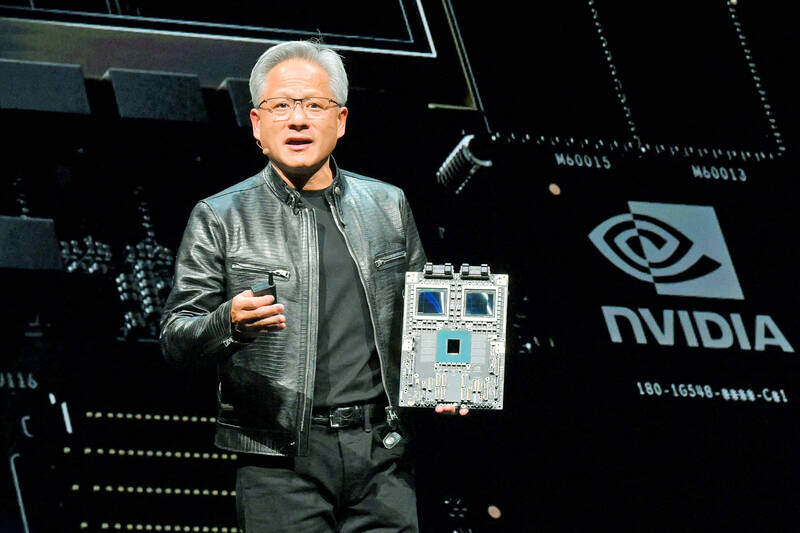Nvidia Corp CEO Jensen Huang (黃仁勳), whose products have become the hottest commodity in the technology world, on Wednesday said that the scramble for a limited amount of supply has frustrated some customers and raised tensions.
“The demand on it is so great, and everyone wants to be first and everyone wants to be most,” he told the audience at a Goldman Sachs Group Inc technology conference in San Francisco. “We probably have more emotional customers today. Deservedly so. It’s tense. We’re trying to do the best we can.”
Huang’s company is experiencing strong demand for its latest generation of chips, called Blackwell, he told the audience.

Photo: Sam Yeh, AFP
The Santa Clara, California-based business outsources the physical production of its hardware, and Nvidia’s suppliers are making progress in catching up, he said.
Nvidia’s chips are used by data center operators to develop and run artificial intelligence (AI) models. The feverish appetite for such services has sent its sales — and stock price — soaring. The shares have more than doubled this year, following a 239 percent run-up last year.
The stock gained 8.1 percent to US$116.91 in New York on Wednesday, marking its biggest single-day rise in six weeks.
Nvidia counts on a small number of customers — data center operators such as Microsoft Corp and Meta Platforms Inc — for much of its revenue.
Huang was asked whether the massive AI spending is providing customers with a return on investment. That has been a concern during the tech industry’s AI frenzy.
However, he said companies have no choice other than to embrace “accelerated computing.” Nvidia’s technology speeds up conventional workloads — data processing — as well as handling AI tasks that older technology cannot manage, he said.
Nvidia leans heavily on Taiwan Semiconductor Manufacturing Co (TSMC, 台積電) for production of its most important chips and does so because that company is the best in its field by a large margin, Huang said.
However, geopolitical tension has raised risks. China sees Taiwan, where TSMC is based, as a rogue province, stoking concerns that it might try to annex it. That could potentially cut off Nvidia from the key supplier.
Huang said he develops much of the company’s technology in-house and that should allow Nvidia to switch orders to alternative suppliers. Still, such a change would likely result in a reduction in quality of his chips, he said.
TSMC’s “agility and their capability to respond to our needs is just incredible,” he said. “And so we use them because they’re great, but if necessary, of course, we can always bring up others.”
TSMC shares yesterday rose 4.79 percent to close at NT$940 in Taipei trading. The stock has gained 51.94 percent since the beginning of this year.

TAKING STOCK: A Taiwanese cookware firm in Vietnam urged customers to assess inventory or place orders early so shipments can reach the US while tariffs are paused Taiwanese businesses in Vietnam are exploring alternatives after the White House imposed a 46 percent import duty on Vietnamese goods, following US President Donald Trump’s announcement of “reciprocal” tariffs on the US’ trading partners. Lo Shih-liang (羅世良), chairman of Brico Industry Co (裕茂工業), a Taiwanese company that manufactures cast iron cookware and stove components in Vietnam, said that more than 40 percent of his business was tied to the US market, describing the constant US policy shifts as an emotional roller coaster. “I work during the day and stay up all night watching the news. I’ve been following US news until 3am

UNCERTAINTY: Innolux activated a stringent supply chain management mechanism, as it did during the COVID-19 pandemic, to ensure optimal inventory levels for customers Flat-panel display makers AUO Corp (友達) and Innolux Corp (群創) yesterday said that about 12 to 20 percent of their display business is at risk of potential US tariffs and that they would relocate production or shipment destinations to mitigate the levies’ effects. US tariffs would have a direct impact of US$200 million on AUO’s revenue, company chairman Paul Peng (彭雙浪) told reporters on the sidelines of the Touch Taiwan trade show in Taipei yesterday. That would make up about 12 percent of the company’s overall revenue. To cope with the tariff uncertainty, AUO plans to allocate its production to manufacturing facilities in

Six years ago, LVMH’s billionaire CEO Bernard Arnault and US President Donald Trump cut the blue ribbon on a factory in rural Texas that would make designer handbags for Louis Vuitton, one of the world’s best-known luxury brands. However, since the high-profile opening, the factory has faced a host of problems limiting production, 11 former Louis Vuitton employees said. The site has consistently ranked among the worst-performing for Louis Vuitton globally, “significantly” underperforming other facilities, said three former Louis Vuitton workers and a senior industry source, who cited internal rankings shared with staff. The plant’s problems — which have not

COLLABORATION: Given Taiwan’s key position in global supply chains, the US firm is discussing strategies with local partners and clients to deal with global uncertainties Advanced Micro Devices Inc (AMD) yesterday said it is meeting with local ecosystem partners, including Taiwan Semiconductor Manufacturing Co (TSMC, 台積電), to discuss strategies, including long-term manufacturing, to navigate uncertainties such as US tariffs, as Taiwan occupies an important position in global supply chains. AMD chief executive officer Lisa Su (蘇姿丰) told reporters that Taiwan is an important part of the chip designer’s ecosystem and she is discussing with partners and customers in Taiwan to forge strong collaborations on different areas during this critical period. AMD has just become the first artificial-intelligence (AI) server chip customer of TSMC to utilize its advanced